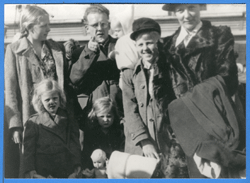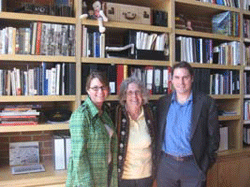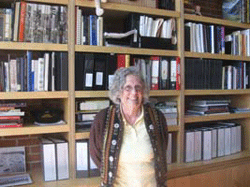Sobey Wall of Honour
Column
119
Row
17
A Brief History of Irmgard Brall ( nee Raulf )
Irmgard, Bertine, Henny, Lina was born on September 1st, 1915 in a little town in Germany called Bueckeburg. Her parents were Hermann and Anna Raulf (nee Schlieper). Hermann was a master print setter for a newspaper in the town of Minden and Anna was a homemaker who had been born and raised on a prosperous farm near the university town of Goettingen. Irmgard remained an only child, a fact she repeatedly referred to as being very lonely. Nevertheless, she spent many happy holidays on her grandmother's farm where she played with her cousins in a beautiful rural setting. Irmgard went to school until she was fourteen. At that time she was confirmed into the Lutheran Church. In Germany this was considered a rite of passage into young adulthood. Following age 14 she was apprenticed to a shop which designed and completed customized embroidery work. In those days a woman's dowry consisted of all her linens bearing her initials embroidered on towels, bedding, table cloth etc. While learning her craft atthe shop Irmgard also went to trade school where the focus was on subjects like bookkeeping, nutrition and business practices.
A fortuitous occurrence changed the direction of her life forever when the daughter of a colleague of her father's was in need of a bridesmaid because the woman designated to do this honour had just gotten a job and could not take the day off. In the 1930's conditions were tough in Germany with many people being destitute and out of work. Thus having just landed a job was a great feat. Now this is where Irmgard's destiny comes into play. She was asked to stand in as a bridesmaid. The bridegroom was from the military and his best man was asked to pick up the intended bridesmaid in a horse drawn carriage. The best man was Karl Brall. It was love at first sight between best man and stand in bridesmaid. A carefree courtship involving paddling on the river Weser and dancing in outdoor restaurants ensued. The couple was not allowed to marry until Karl had achieved a certain rank in the military. Both potential marriage partners had to prove that they were Aryan (Hitler was in power by this time) and they had to have enough furniture and household goods to set up a home. All these requirements were met in December 1935 when Karl and Irmgard were finally married. Being in the military meant a lot of moving around. The first move was to the historic city of Fulda. After a difficult pregnancy the first child was born on January 16, 1937 at home - a daughter they named Renate. After another military transfer that year to Muelhausen, a son Karl was born on December 27th. Now Irmgard and Karl were the parents of two babies born in the same year. The political situation was tense. Hitler was agitating for war and Karl was called to duty in France, Czechoslovakia and later to Russia. He only came home on leave and Irmgard was left to look after the welfare of the family. In 1939 the family was transferred to another little university town, Marburg/Lahn. Without the presence of a husband, shortages of food, heat and water and constant air raids and nightly visits to shelters, life was difficult, not only for Irmgard, but for most women in Germany. One also had to be vigilant in what one said - Hitler's cadres had ears everywhere. The consequences of a politically incorrect utterance could land one in a concentration camp.
In November 1944 a second son, Rudolf, was born. He did not live for long. He died in April 1945 along with many other young children in that town when diseases and shortages of just about everything claimed so many lives. The war had come to a disastrous end. Unbeknownst to Irmgard, Karl had been sent from the Russian war theatre to the western front to fight against the invading American forces. Here he was captured by the Americans and held in one of their notorious prison camps in Kreuznach where prisoners of war were kept under the open skies and fed very little food. Many died under those conditions. In 1945 Germany was in ruins. Workers for farms were in high demand and Karl volunteered and got out of prison camp. He was reunited with his family in the summer of 1945. He worked on a farm for some months. The income from this activity was not enough to sustain the family and he looked for other work. Eventually Irmgard's parents in Minden/Westphalia found a job for Karl in the local newspaper and the family moved in with the grandparents. Times were difficult with shortages of food and other essentials till the Reichsmark was devalued to Deutschmark. Everyone started out with a basic allotment of new money. Goods become available again. On April 1, 1946 a second daughter was born. Her name was Regina and she was the special delight of her grandfather who died shortly after her birth of liver cancer. On September 3, 1947 another daughter, a little red haired Magdalena joined the family.
After the grandfather's death Karl got a job with an American import/export firm in Frankfurt/Main. For many years he travelled by train to see his family on weekends. Eventually a home was found in Frankfurt and the family moved there and the grandmother moved to her ancestral farm. In Frankfurt the family was starting to do well after the difficulties of WWII and on September 7, 1950 a son was born by the name of Reinhard.
The dramatic events of the war had left the family scarred and Irmgard and Karl were looking for a new beginning. After considering many options and even taking some lessons in Portuguese for immigration to South America they finally decided to come to Canada.
On September 25th, 1951, following a rough Atlantic crossing on the "Homeland" the family arrived in Halifax on the now famous pier. After being processed by very courteous immigration officers the journey continued by train through endless stretches of wilderness. The destination was London, Ontario. At the railway station they were met by a farmer who held up Karl\'s photo. He was to be Karl\'s employer. One of the conditions of coming to Canada meant that you had to work on a farm for a year. The family was housed in a farm house and paid $80.00 a month for working seven days a week. Even in those days that money was not enough to sustain the family and Karl took the train out to British Columbia where a friend worked on a farm in Qualicum Beach owned by the forest tycoon MacMillan. Here he was paid twice the amount than in Ontario. Irmgard and the children stayed behind in Dashwood, Ontario where a kind family took them into their home while Irmgard and Renate worked to earn enough money to take the train to British Columbia. Irmgard worked in a restaurant where she earned 25 cents/hour which was actually half the amount paid to other workers. Renate babysat with a family in Grand Bend and occasionally earned money cleaning chickens. Gradually enough money for the journey across Canada accumulated and eventually everyone was united in Qualicum in 1952. At first they lived in a log cabin. All the children started school and Renate got a part time job in a restaurant and then in a grocery shop. Although conditions were tough there was a great feeling of optimism and joy with every little bit of advancement along the economic front. In 1953 a pastor suggested to Karl to try out for a job in Port Alberni where the forest industry was booming. He got a job in the plywood factory. The family moved into rental housing in Alberni. Irmgard and Renate went looking for jobs to supplement the family income. Irmgard was hired as a short order cook in the Three Sisters Cafe and Renate as a waitress. All of Irmgard's wages went for groceries for the family and Karl's wages were realized for a big dream - a property. The dream came true in 1956 when a 15 acre parcel of land with house and outbuildings was purchased on Beaver Creek Road. By this time Irmgard's mother had joined the family and helped out with looking after the household. The oldest son Karl was apprenticed by the railway and was the first person to purchase a truck. These were heady days. Irmgard stopped working in town and looked after a huge garden and many animals. All these contributed to the family's food supply. A cow provided milk for cheese and butter, chickens, geese and ducks laid eggs and the odd pig was slaughtered for roasts and hams.
The children went to school. Later they graduated and moved away from the valley to pursue their own family lives and careers. Son Karl stayed on the island to become a locomotive engineer, a career he pursued until his retirement.
Irmgard and Karl led a peaceful retirement life, enjoying their little piece of paradise. They had a happy marriage and were always grateful for the good fortune of living on beautiful Vancouver Island. Karl died peacefully at home one Sunday afternoon in 1955 after having visited church. Irmgard was devastated. They had been married for almost 60 years and had shared good times and bad times.
Irmgard now resides in Echo Village where she is visited daily by her son Karl. Her memories come and go but she is still able to enjoy the beauties of nature and the kindness of her fellow human beings.
She tried very hard to be a good mother and wife. The family of many siblings that she missed as a child was fully realized by her own six children.


